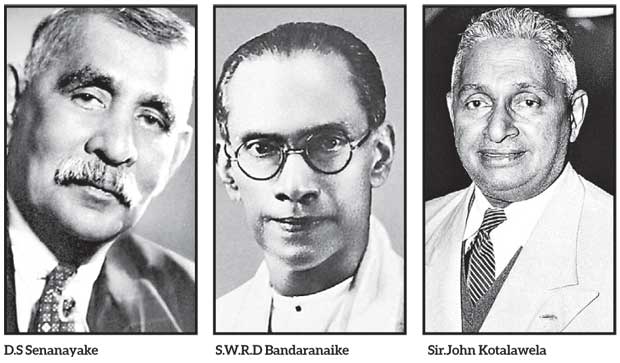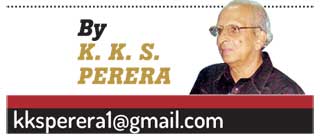Reply To:
Name - Reply Comment

Don Stephan Senanayake, as in Shakespearian ‘dogma’, was not born great, but achieved greatness and greatness, to a certain extent was trust upon him too; but in Little Solomon West Ridgway’s case the dogma applied in its totality, SWRD named after Governor, Joseph West Ridgeway by his Maha Mudaliyar of the Governor’s Gate father, Sir Solomon Dias Bandaranaike, was born great, achieved greatness and had greatness thrust upon him too.
Born to an aristocratic family Bandaranike’s schooling was more westernized compared to D S Senanayake. Both studied at S. Thomas’ College—SWRD stayed at the Warden’s residence instead of the common boarding where DS did. Governor, Sir Joseph West Ridgeway was the god father of the baby born on January 8, 1899 to Sir Solomon, a leading light of colonial bourgeoisie and Lady Dais Obeysekera, both from Siyane-Korale. Ironically, SWRD was responsible for the collapse of aristocracy.
Senanayake. Both studied at S. Thomas’ College—SWRD stayed at the Warden’s residence instead of the common boarding where DS did. Governor, Sir Joseph West Ridgeway was the god father of the baby born on January 8, 1899 to Sir Solomon, a leading light of colonial bourgeoisie and Lady Dais Obeysekera, both from Siyane-Korale. Ironically, SWRD was responsible for the collapse of aristocracy.
Young West Ridgeway was sent to Oxford, where he excelled as one of the brilliant students who stunned the Englishmen with his oratorical skills, but he could not utter a word in his mother tongue on his return.
Little known Don Bartholomew Senanayake, from Botale, in Hapitigam Korale had a son by the name Spater. Don Spater, engaged in the graphite industry as a teenager and invested profits in plantations and arrack renting. He became owner of thousands of acres. [Arnold 1907: pp 611/614].
However, Spater not only bade good-bye to renting business but became a staunched anti-arrack campaigner at the turn of the century; he also got his sons DC, FR and DS to join in the temperance movement and made their mark in politics as well. As members of Temperance movement initiated by the father along with many Sinnhala-Buddhist leaders at the very young age of twenties they earned the wrath of Colonial masters. Senanayakes were labelled Ceylonese bourgeoisie of ‘nobodies’ who spent lavishly on the anti-arrack movement.
Maha Mudaliyar, Sir Solomon Dias, father of SWRD was the aide-de-camp for Chalmers who ‘wined and dined’ with the Brits at Horagolla during the 1915 riots. SWRD’s maternal uncle S. C. Obeysekara who was a member of Legislative Council in 1915, speaking at the debate on the riots made a contemptuous comment on the Senanayakes, “…the poor farmers and villagers have been deluded into a trap for personal aggrandizement of a few ‘nobodies’, who hope to make ‘some bodies’ of themselves by such disgraceful tactics” -: Hansard - August 11; 1915 of 442
"While DS’s popularity and strength helped in drawing mass support, SWRD’s decision to bring his SMS considerably strengthened the idea. Various religious and ethnic groups like Christians and Muslims rallied round the new party"
The UNP emerged as an offspring of three powerful political forces of the day, namely, the Ceylon National Congress, a strong political entity, the Sinhala Maha Sabha of Bandaranaike and the Muslim League of T. B. Jayah. They led the UNP to victory in the country’s first Parliamentary elections held in 1947.
In early 1946 DS was thinking over problem of a national party that would represent a national consensus of moderate views; a party acceptable to the minorities. He thought the Congress had lost the support of the minorities and seemed most unlikely to reclaim it. Most members of CNC and all in State Council accepted his invitation to form the UNP on the eve of Parliamentary elections 1947. While DS’s popularity and strength helped in drawing mass support, SWRD’s decision to bring his SMS considerably strengthened the idea. Various religious and ethnic groups like Christians and Muslims rallied round the new party.
“The inaugural meeting of the United National Party was held on Friday, September 6, 1946 at 5 p.m. at ‘Palm Court’, Albert Crescent. ‘The following resolution, “That this meeting resolved to form a political Party to be called the United National Party,” was moved by S. Natesan, Member State Council [MSC] and seconded by T. B. Jayah, MSC. The resolution was put to the house and was carried unanimously.’
Col. J. L. Kotalawala who was convener welcomed the members and read the letters conveying the meeting. […he mentioned that out of 370 invitations sent 301 consented to join-CDN: 7/9/46] He then invited DS to occupy the Chair. DS took the chair and addressed the meeting and explained the aims and objects of the Party. He also explained the importance and the need for unity among all communities residing in the island, he also appealed for mutual trust and goodwill and expressed the hope that the UNP will be a strong political force in the country and will play a great role in moulding the future destines of the people.
The next resolution, “that this meeting adopts the manifesto and Constitution of the Party” was moved by Francis Mollamure, MSC and seconded by A. R. A. Razik, MSC. Then followed the election of office bearers - DS vacated the Chair and SWRD occupied the chair protem and after delivering a short address proposed the name of D. S. Senanayake as Chairman of the Party George E. de Silva seconded it and was carried unanimously.
DS proposed from the chair the election of Messers Bandaranaike, Kotalawala, George E. de Silva, A. Mahadeva, and T. B. Jayah as vice-chairman and this was carried unanimously.
"The UNP emerged as an offspring of three powerful political forces of the day, namely, the Ceylon National Congress, a strong political entity, the Sinhala Maha Sabha of Bandaranaike and the Muslim League of T. B. Jayah"
SWRD Bandaranaike, the second in command of the government and UNP, as Times of Ceylon [August 8, 1949] reported, referred to the party using vituperative remarks. Within hours Prime Minister DS Senanayake, the leader of the party and disciplinarian as a matter of urgency summoned the WC to take up the issue.
It met at 9.00 p.m. at Temple Trees the same evening, where Bandaranaike was requested to make an explanatory statement within seven days to the WC.
Excerpts from Minutes: “WC meeting held at Temple Trees at 9.15 pm on August 8, 1949. DSS presided- Present: SWRD [Late arrival], Sir John Kotalawela, T.B. Jayah…After the minutes Sir John wanted leave to bring ‘a matter of great urgency and importance’ before the house.
He placed before the committee a copy of the ‘Times of Ceylon’ of 8th [same day] instant and read there from the report of a speech alleged to have been made by SWRD at a meeting of the SM Sabha and invited the house to consider what action, if any, committee should take as the speech, he urged was highly detrimental to the interest of the Party…The following resolution was adopted, to wit:
After a general discussion in which all the members present joined, the following resolution were unanimously adopted, to wit,
1. “that in the opinion…the speech…contained, (a) matters which were inaccurate in point of fact and, (b) opinion which bought [or were calculated to bring] the Party into ridicule and disrepute thereby undermining the confidence of the public in the Party….2. That this matter be brought up before the usual monthly meeting of WC to be held at TT on 15/8/49…to consider action…3. Secretary to write immediately to SWRD, inquiring the correctness of the report…get him to make a statement…discuss it at next meeting…
SWRD’s reply was taken up at the monthly meeting on August 15. He wrote, the newspaper report as, ‘…inaccurate in some aspects’ in reporting and ‘…conveying an inaccurate impression’. The WC decided to write to Times highlighting points raised in the letter. One attributed to SWRD said,
“…no important question was ever placed before the EC of the Party; it had never met. At the end of the year the members had to play the part of ‘yes-man’—to which SWRD replied, “I said, Parties in Ceylon, both in the past and the present had displayed a tendency not sufficiently to consult party organizations when important questions arose, the UNP was falling into the same tendency and in its best interest this should be remedied.” The explanation was accepted. [Original minutes of UNP- courtesy JR Jayewardene Centre]
Two leaders were the custodians of traditional forces; their combined labors led the UNP to victory at the Parliamentary elections held under Soulbury Constitution in 1947. However, personality and policy clashes between the top two aggravated. The first signs of a cracks emerged when Bandaranaike made some sarcastic remarks as mentioned before which gradually developed into wider cracks leading to a major split in July 1951.
“I do not intend on this occasion to indulge in any recrimination or personal bitterness—the issues involved are far too important for that…when I assisted originally in the formation of UNP and persuaded SM Sabha to join it and when I myself agreed to serve in the present government, I did so in order to ensure that the stability of the government which was needed particularly at the beginning of the new era of freedom. There does not appear to me any important change in the line of thinking and acting…” – cross-over speech -Hansard-12/07/1951.
DS used Kotalawala to persecute SWRD at Cabinet meetings; astute Bandaranaike acted cautiously in many instances as the trick boomeranged compelling DS to put the blame on his loyal nephew Lionel [Sir John’s mother and DS’s sister-in-law happened to be sisters] to foil a poor reflection on his standing.
The hostility between DS and SWRD was a false one created by the old warrior’s political manoeuvrings while he groomed his son Dudley to take over the reins after him while SWRD aspired [to create a new post] to become the deputy PM. It did not take long for the barrister from Oxford to realise what was in store for him. The tragedy was awaited until mid-1951, when he finally made up his mind to bid good bye to the party and form the SLFP.
DS, though needed the support of SWRD in forming the UNP, he had his reservations apart from the natural aversion and distaste that he carried in his mind based on personal interests and past recollections.